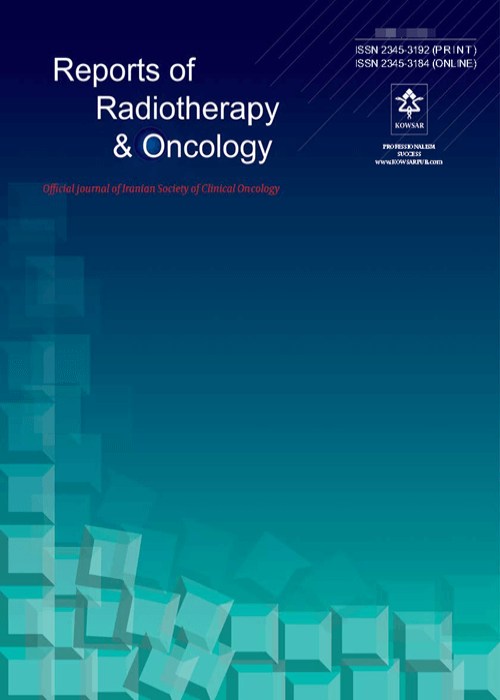فهرست مطالب
Reports of Radiotherapy and Oncology
Volume:1 Issue: 1, Jun 2013
- تاریخ انتشار: 1393/03/01
- تعداد عناوین: 7
-
-
Page 1
-
Page 3ObjectiveThe objective of this study was to investigate the effect of Calendula officinalis mouthwash on preventing radiotherapy-induced Oral MucositisMaterials And MethodsPatients with head and neck cancers referred to our center for radiotherapy were divided into two groups, one receiving drug and the other group receiving placebo. Patients in the drug group received 2% Calendula gel. Oral Mucositis Assessment Scale was used to evaluate oral mucositis intensity at the end of each week. The scale of mucositis at the end of each week was compared between groups.ResultsCalendula gel significantly decreased the intensity of oral mucositis as compared to placebo at the end of the 2nd (p=0.019), 3rd (p<0.0001) and 6th week (p=0.031).ConclusionCalendula gel could be effectively used to decrease the intensity of radiotherapy- induced oral mucositis.Keywords: Radiotherapy, muscositis, Calendula officinalis
-
Page 11BackgroundResponse to chemotherapy is a reliable marker for radiation sensitivity in patients with locally advanced head and neck squamous cell carcinoma. We compared the response rate and toxicity after two cycles of chemotherapy using Docetaxel / Cisplatin /5FU or Cisplatin / 5FU among these patients.MethodsWe randomly assigned 16 to 75 years old patients with stage III or IV non-metastatic locally advanced head and neck squamous cell carcinoma to receive either DCF or CF every 3 weeks for two cycles. All patients who received at least one and two cycles of chemotherapy were considered for toxicity and response evaluation respectively.ResultsSeventy patients underwent randomization, 36 and 34 patients were assigned to Docetaxel / Cisplatin /5FU and Cisplatin / 5FU groups respectively. Three and 8 patients were excluded after randomization and before receiving any chemotherapy in Docetaxel / Cisplatin /5FU and Cisplatin / 5FU groups respectively. Finally 30 and 25 in Docetaxel / Cisplatin /5FU group and 25 and 23 patients in Cisplatin / 5FU group were evaluated for toxicity and response respectively. Response rate (complete and partial response) was %83 (35% complete and 48% partial response) and %84(16% complete and 68% partial response) in Cisplatin / 5FU and Docetaxel / Cisplatin /5FU groups respectively (P= 0.28). There was no differences in complete response rate between two groups (P=0.18). Neutropenia, phlebitis and mucositis were more common in Cisplatin / 5FU group without statistically significant difference. Constipation was significantly more common in Cisplatin / 5FU group (P= 0.008). Diarrhea, alopecia and febrile neutropenia were significantly more common in Docetaxel / Cisplatin /5FU group (P= 0.006, 0.01 and 0.03 respectivly).ConclusionWe could not find any significant differences between response to Docetaxel / Cisplatin /5FU and Cisplatin /5FU combination chemotherapy among Iranian patients with locally advanced head and neck squamous cell carcinoma. However, for better evaluation, larger studies with better designs are being conducted in our center.Keywords: Docetaxel
-
Page 19IntroductionUpper limbs lymphedema is one of the rather common and debilitating sequels of breast cancer treatment. The incidence of this sequel has been reported in different sources to be from 25% to 38%. The purpose of this study was to evaluate the incidence and the risk factors of lymphedema following invasive breast carcinoma treatment.Materials And MethodsRecorded data of breast cancer patients referred to Mashhad Omid Hospital between 1997 and 2005 were evaluated for the incidence and risk factors of lymphedema. Univariate and multivariate analysis were performed to evaluate the risk factors using a logistic regression model.ResultsOut of 312 patients entering the study 101 patients (32.4%, 95% CI: 27.2-37.6) developed lymphedema. Univariate analysis did not show a statistically significant difference between the rates of lymphedema in radical mastectomy when compared to other types of surgery such as lumpectomy with axillary dissection. Obesity according to body mass index significantly affected the development of lymphedema (p=0.03). The average number of metastatic nodes was 4.56±4.05 in patients who had and 2.48±3.19 in patients who did not have lymphedema (p<0.01). The average percentage of metastatic to excised nodes was %54.59%±37.48 in patients who had and %34.67%±34.84 in patients who did not have lymphedema (p<0.01). Age, the number of excised nodes, the stage of disease, hormonal therapy, adjuvant radiation therapy and chemotherapy had no correlations with lymphedema.ConclusionAccording to our findings, body mass index, the number of metastatic nodes and thepercentage of metastatic to excised nodes were correlated with the development of lymphedema.Keywords: Breast carcinoma, surgery, lymph node, lymphedema, body mass index, radiotherapy, risk factor
-
Page 25Meningeal carcinomatosis is a rare event in bladder transitional cell carcinoma. In this report, we present a man with transitional cell carcinoma who developed brain metastasis followed by spinal and leptomeningeal involvement.Keywords: Meningeal carcinomatosis, carcinoma, transitional cell, Radiotherapy
-
Page 29BackgroundEsophageal Squamous Cell Carcinoma is one of the most common GI cancers in Iran. Development of para-aortic lymphadenopathy is classified as stage IV and long term survival is rare. We report a case of esophageal SCC with paraaortic lymphadenopathies, who was treated with systemic and nonsurgical locoregional therapy. Report of the case: A 39-year-old female with SCC of the distal esophagus and proximal stomach, that was unresectable on laparatomy, was referred to our center for palliative treatment. She received six cycles of chemotherapy (Paclitaxel / cisplatin), and then concurrent chemotherapy and radiotherapy to the primary tumor and paraaortic region with a total dose of 5220 centigray (cGy). Six years later, she was still alive without any complaints or disease progression.ConclusionIt seems that patients with locally advanced unresectable Esophageal Squamous Cell Carcinoma can be treated radically with systemic and nonsurgical locoregional therapy, to achieve long term survivalKeywords: Esophageal squamous cell carcinoma, survival, treatment


